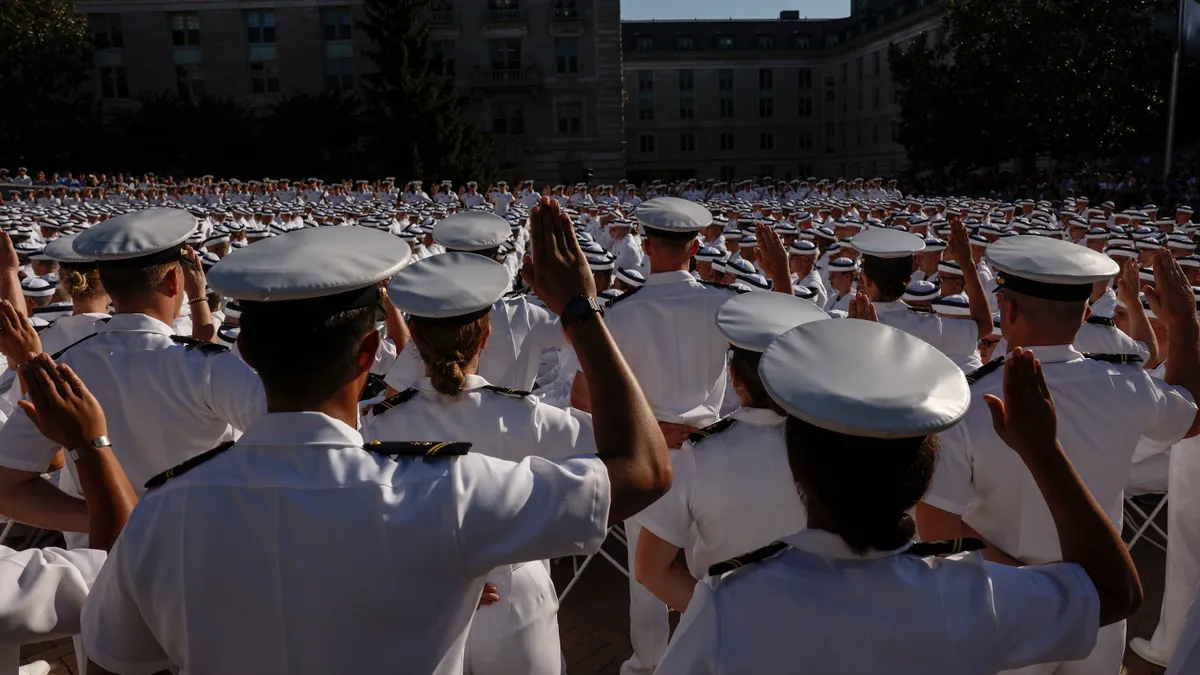Dive Brief:
- A federal judge upheld the U.S. Naval Academy's race-conscious admissions policies Friday, stymieing a lawsuit from the organization that successfully halted those practices at civilian colleges in a landmark U.S. Supreme Court case last year.
- The Maryland institution's use of race-conscious admissions is in line with the high court's ruling, which exempted military academies from the ban, U.S. Senior District Judge Richard Bennett wrote in his 179-page decision. Race-conscious admissions helps the Naval Academy create "an officer corps that represents the country it protects and the people it leads," he wrote.
- Students for Fair Admissions, the plaintiff in the lawsuit, plans to appeal the ruling, according to a Friday news release. A spokesperson for the Naval Academy said the institution is reviewing Bennett's decision.
Dive Insight:
In June 2023, the Supreme Court banned colleges from considering race and ethnicity when making admissions decisions, overturning decades of precedent. However, the court explicitly exempted military academies from its ruling.
Chief Justice John Roberts acknowledged in a footnote in the court's majority opinion that military institutions may have “potentially distinct interests” from traditional colleges.
In the lead-up to the decision, 35 top former military leaders argued in a court filing that race-conscious admissions is essential to maintaining “a diverse, highly effective officer corps,” as well as the “continued vitality of the U.S. military."
SFFA President Edward Blum disagreed with the Supreme Court’s exemption and swiftly filed lawsuits challenging race-conscious admissions against two of the country's five military academies — the Naval Academy and the U.S. Military Academy at West Point, in New York.
Both the Naval Academy and West Point are highly selective, with fall 2023 acceptance rates of 9% and 14%, respectively.
“By tethering its use of race to the racial demographics of the enlisted corps and the country as a whole, the Academy is violating equal protection,” SFFA argued in its lawsuit against the Naval Academy.
A few months after the lawsuit was filed, Bennett ruled that the Naval Academy could continue using race-conscious admissions policies while he considered the legal challenge.
Under the Supreme Court's ruling, the Naval Academy can consider race only if there is no "workable race-neutral alternative" to ensure a sufficiently diverse class, Bennett wrote in Friday’s decision. He added that the academy has made "a serious, good faith effort" to find alternatives to the practice.
However, "no workable race-neutral alternatives will currently permit the USNA to achieve the level of diversity the Government has credibly found necessary for its national security mission," Bennett wrote.
The judge also noted that the institution’s consideration of race doesn’t have a large impact on admissions for the academy's White applicants, because so few racial and ethnic minority students apply.
From the 2018-19 to 2022-23 admissions cycles, White applicants outnumbered Black applicants 7-to-1, he wrote.
Bennatt wrote that SFFA failed to prove the academy participated in racial balancing — an unconstitutional practice that aims to match an institution's demographic makeup with that of a broad community.
In fall 2022, 6% of the Naval Academy's student body was Black or African American, while 14% were Hispanic or Latino. Both groups are disproportionately low compared to the national population.
"The evidence in this case clearly indicates that the Naval Academy does not employ quotas, admit candidates based solely on their race or ethnicity, or place minority candidates on separate admissions tracks," he wrote. Instead, race or ethnicity is one of several non-determinative factors the academy considers.
Blum said Friday that SFFA is disappointed by the ruling, but that the group will continue to seek legal intervention.
“Just as we did in our successful lawsuits against Harvard and the University of North Carolina, SFFA will appeal this to the appellate court,” Blum said in a Friday statement. “If we are unsuccessful there, then we will appeal to the U.S. Supreme Court.”
The organization has previously signaled it may take legal action against the U.S. Air Force Academy.
"Were you rejected from West Point? Or the Naval Academy or the Air Force Academy? It may be because you’re the wrong race," a SFFA-run website asserts. It includes a form for applicants who didn't receive admissions offers to submit their contact information.
The Air Force Academy has struggled to maintain a diverse student body. In fall 2022, 63% of its students were White, according to federal data. Black or African American students made up 6% of attendees, while Hispanic or Latino students accounted for 12%.














